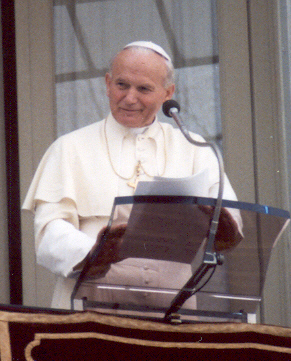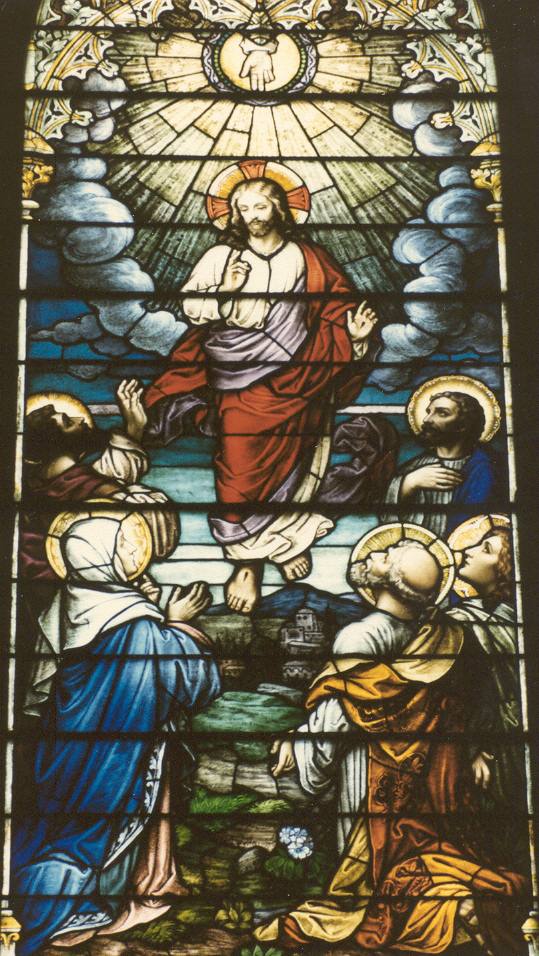
Ascension Sunday
A
Homily - B Cycle - 2002-2003
First Reading - Acts 1:1-11
Psalm - 47:2-3, 6-7, 8-9
Second Reading - Ephesians 1:17-23, or 4:1-13 or 4:1-7, 11-13
Gospel - Mark 16:15-20
Mark wrote to explain Christ
to the new Gentile converts.

Jesus said to his disciples: "Go into the whole world and proclaim the gospel to every creature. Whoever believes and is baptized will be saved; whoever does not believe will be condemned. These signs will accompany those who believe: in my name they will drive out demons, they will speak new languages. They will pick up serpents with their hands, and if they drink any deadly thing, it will not harm them. They will lay hands on the sick, and they will recover."
So then the Lord Jesus, after he spoke to them, was taken up into heaven and took his seat at the right hand of God. But they went forth and preached everywhere, while the Lord worked with them and confirmed the word though accompanying signs.
Some
years ago, a college classmate of mine spent a summer as a White House intern.
In fact, she was in the class of interns as the most notorious White House
intern to date, Monica Lewinsky. During the summer internship in
Washington, my friend was asked to give a private tour of the White House to a
delegation of cardinals visiting from the Holy See. Herself a Catholic,
she was very excited to share her knowledge of the White House with these
distinguished guests. When the tour arrived at the Hall of Presidents, my
friend proudly exclaimed that this was a hall of great pride since it contained
portraits of every single successor of George Washington - more than 40 in a
proud and unbroken line of tradition.
 The
cardinals politely chuckled but she did not understand their amusement.
She asked one of the cardinals who spoke English what the other cardinal found
so curious. He replied simply, "My dear, you have had over 40 presidents
in the country and you call it a line of tradition. Well, in the Roman
sense, when we think of tradition, we are reminded that His Holiness, the Pope,
is the 263rd successor of the Apostle Peter - somewhat of a longer line of
tradition, wouldn't you say?"
The
cardinals politely chuckled but she did not understand their amusement.
She asked one of the cardinals who spoke English what the other cardinal found
so curious. He replied simply, "My dear, you have had over 40 presidents
in the country and you call it a line of tradition. Well, in the Roman
sense, when we think of tradition, we are reminded that His Holiness, the Pope,
is the 263rd successor of the Apostle Peter - somewhat of a longer line of
tradition, wouldn't you say?"
And it is true. For nearly 2,000 years, the Apostolic tradition has meant that every single bishop in the world can trace their Apostolic lineage to one of the 12 Apostles, that is, after Matthias replaced Judas. The mandate that Christ gives in our Gospel today - to preach to all the nations and baptize - set this lineage in motion.
We learn that Christ desires for all the nations to hear the Gospel - that means, that He desires all to be saved. By our baptism, we each have the mandate to spread the Gospel message to every sector of society - to shed the light of the Gospel in areas that remain in the darkness of ignorance of Christ or in sin. This mandate then, means that we have an obligation as members of the Body of Christ to work in conjunction with our head - the Pope and the bishops and the priests who are their local collaborators to fulfill the mandate that Christ sets forth in the Gospel today. Many of you know that this was the major thrust of the Second Vatican Council - to empower and invigorate the laity to sanctify the world. Sadly, we have seen in the last 40 years how this has been misconstrued at times. We often see what has evolved into the laicization of the clergy and the clericalization of the laity. What this means is that at times, we see priests who lose their priestly identity and live more like bachelors and not as men of prayer, dedicated to the care of their flocks, as they were ordained to be. By the same token, we see lay faithful claim a right to certain roles in the sanctuary, instead of working in collaboration and under the headship of their priests in service to the rest of the parish. I have actually seen lay persons in another parish tell a priest that he could not distribute Holy Communion at Mass because it would cut down on lay involvement in the parish. What is needed is a renewal of education in the documents of the Second Vatican Council - people ought to read what the Council says rather than claim an illusory "Spirit of Vatican II." That is why the headship of the bishop and his priests is so crucial in our day - it helps to keep everything together.
In our Gospel this morning, Jesus clearly states that baptism is necessary for salvation. Of course, many wonder how those who are not baptized can be saved. The Catechism explains that the ritual of Baptism can be replaced by either martyrdom, also known as baptism by blood; or by a perfect act of love for God and perfect sorrow for one's sins, together with a desire for baptism, also known as baptism by desire. In fact, the persons which the Catechism clearly states cannot go to heaven are those who know that the Church was founded as necessary to God through Christ, and, who either refuse to enter into it or remain in it. This is the only category of persons who cannot be saved. It makes sense - God will not force someone who rejects the Church and yet knows that it is the one true Church, force them into heaven against their conscience.

The point of the Ascension was to advance the work of salvation, not to make it harder. Some will say that they would have deeper faith if they could have only seen the actual event. We all know, however, that going back in time to see Christ raise the dead would not guarantee the gift of faith. After all, Judas Iscariot spent three years watching rows of invalids rise to their feet, saw bread multiplied for multitudes and even saw corpses rise from the dead in the presence of Jesus, and yet Judas still put a contract out on Him. The Lord's Ascension into heaven and his sitting at the right hand of the Father is the sixth article of faith within the Apostles Creed. By this mystery we believe, based on the eyewitness testimony of the Apostles, that Jesus Christ in his resurrected body and soul went up into heaven, and took his seat at the right hand of God the Father in order to take possession of the kingdom that he won through His death and prepare a place for each of us in heaven, making way for the Holy Spirit to be sent upon the earth and inspire the Apostles to preach the Gospel to every land. When Christ ascended into heaven, he did so on His own power and he ascended as true God and true man. Christ still bears the marks of the Passion but is now in a glorified state. At the Ascension, what once startled the Apostles on Easter Sunday night is now become their great hope that what awaits those who believe is nothing short of eternal life. It was this evidence that compelled the Apostles to preach to the point of shedding their blood as martyrs.
The Ascension, then, should instill within us great hope - a trust in God that confirms our faith that like Him, we can transcend all of the suffering of this life and of the world and one day join Him in heaven, where He has preceded us to go and prepare places for each of us who choose to remain firmly rooted in Him. The Ascension, then, also compels us to go after those souls who are still so far away from really knowing Jesus - perhaps it's the person near despair; it's the co-worker or neighbor who needs to know that life is worth living and that there is a life in the world to come beyond all the riches we can amass on this earth and that what we do here on earth will reap either a great reward or eternal punishment.
Let us pray that we continue to lift up our hearts to our Father in heaven, with our eyes firmly set on our heavenly homeland and our ultimate desired destination. May the Blessed Mother, the Mother of the Church, continue to guide our bishops and priests to be credible guides to the kingdom by opening up the mysteries of the faith for us in charity until we come at last to its eternal reward.
Praised be Jesus Christ. Now and forever!
If you find this material
valuable, consider a tax deductible gift to support this site.
The DaCapo Foundation • 2402 Tricia Ct. • Vienna VA 22181
Index A Priest Speaks
Return - Cycle B
Homilies
Top
Home Page